Are you struggling to maintain healthy relationships with your family members? Do you find yourself constantly arguing or feeling distant from your loved ones? Family therapy could be the answer you’re looking for. In this article, we’ll explore what family therapy is, how it works, and why it can be so effective in improving family dynamics.
Introduction: The Importance of Strong Family Relationships
Family relationships are among the most important in our lives. They shape our identity, provide us with support, and offer a sense of belonging. However, as much as we may love our family members, conflicts and misunderstandings can arise that can strain these relationships. Whether it’s a disagreement over finances, a clash of personalities, or a traumatic event that has affected the family as a whole, these challenges can be difficult to overcome alone.
That’s where family therapy comes in. By working with a trained therapist, families can address their issues in a safe and supportive environment, and learn how to communicate and interact with each other in more positive and effective ways.
What is Family Therapy?
Family therapy is a form of psychotherapy that focuses on improving communication and resolving conflicts within a family unit. It can be helpful for families experiencing a wide range of issues, including:
- Parent-child conflicts
- Sibling rivalry
- Divorce or separation
- Grief and loss
- Mental health issues
- Substance abuse
- Trauma or abuse
- Chronic illness or disability
During family therapy sessions, the therapist will work with the family as a whole, as well as with individual family members, to identify the underlying causes of the issues they are experiencing. Through a combination of talk therapy, behavioral techniques, and other approaches, the therapist will help the family develop new strategies for resolving conflicts and strengthening their relationships.
How Does Family Therapy Work?
Family therapy typically involves a series of weekly or bi-weekly sessions that can last anywhere from a few months to a year or more, depending on the nature of the issues being addressed. Sessions may take place in the therapist’s office, or in the family’s home or another location that is comfortable and convenient for everyone involved.
During the sessions, the therapist will use a variety of techniques to help the family members communicate more effectively and work through their conflicts. These may include:
- Active listening: Encouraging each family member to listen carefully to what the others are saying, and to respond with empathy and understanding.
- Role-playing: Using scenarios and exercises to help family members practice new communication and problem-solving skills.
- Conflict resolution: Helping the family develop strategies for resolving conflicts in a healthy and productive way.
- Boundary-setting: Encouraging family members to establish clear boundaries and expectations for their interactions with each other.
In addition to working with the family as a whole, the therapist may also work individually with family members to address specific issues or concerns they may be experiencing.
Benefits of Family Therapy
Family therapy can offer a wide range of benefits for families, including:
- Improved communication: Learning how to express thoughts and feelings in a constructive way can help family members feel more connected and understood.
- Conflict resolution: Developing new strategies for resolving conflicts can help family members avoid the negative cycles of arguing and misunderstanding that can damage relationships.
- Increased empathy and understanding: Learning to see things from another person’s perspective can help family members feel more compassionate and supportive of each other.
- Greater self-awareness: Through therapy, individuals may gain a better understanding of their own feelings and motivations, which can help them make positive changes in their relationships.
- Improved mental health: Family therapy can be helpful for individuals dealing with a range of mental health issues, including depression, anxiety, and substance abuse.

























[…] Family Therapy: Strengthening Bonds and Resolving Conflicts […]